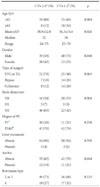Abstract
Purpose
Peritoneal carcinomatosis (PC) has a dismal prognosis and is occasionally encountered during initial exploration in patients with gastric cancer. The clinicopathological characteristics and survival were analyzed in patients with gastric cancer and PC.
Materials and Methods
Among 2,083 gastric cancer patients who received surgery at the department of surgery, Hanyang University Hospital from 1992 to 2009, 130 patients revealed PC. Ten patients who were lost during follow-up were excluded. The remaining 120 patients were divided into three groups according to the type of surgery. The degree of PC was classified into P1(to the adjacent peritoneum) and P2 (to the distant peritoneum). Various other clinicopathological factors were analyzed using univariate and multivariate survival analyses.
Results
Systemic chemotherapy (SC), type of surgery, lymph node dissection, degree of PC, and presence of ascites were significant prognostic factors. However, age, gender, resection of PC, and Borrmann type were not significant prognostic factors. In a multivariate analysis, SC and the degree of PC were independent prognostic factors. The survival benefit of SC was significant without reference to the type of surgery or degree of PC.
Figures and Tables
Fig. 1
Cumulative survival curves according to resection and chemotherapy. R(+) = gastric resection; R(-) = gastric non-resection; C(+) = chemotherapy conducted group; C(-) = chemotherapy not-conducted group.

Table 4
Survival rate according to the chemotherapy in patients who received gastrectomy and bypass surgery or celiotomy only

Table 5
Survival rate according to the chemotherapy in young aged (<65 year) and old aged (≥65 year) patients

Table 7
Clinicopathologic characteristics according to the chemotherapy

STG = subtotal gastrectomy; TG = total gastrectomy; D0 = no node dissection; D1 = 1st tier node dissection; D2 = 1st and 2nd tier node dissection; PC = peritoneal carcinomatosis; *Chemotherapy conducted group; †Chemo therapy not-conducted group; ‡Metastases to the adjacent peritoneum but not the distant peritoneum; §Metastases to the distant peritoneum.
References
1. Gunderson LL, Sosin H. Adenocarcinoma of the stomach: areas of failure in a re-operation series (second or symptomatic look) clinicopathologic correlation and implications for adjuvant therapy. Int J Radiat Oncol Biol Phys. 1992. 8:1–11.

2. Wisbeck WM, Becheer EM, Russell AH. Adenocarcinoma of the stomach: autopsy observations with therapeutic implications for the radiation oncologist. Radiother Oncol. 1986. 7:13–18.

3. Landry J, Tepper JE, Wood WC, Moulton EO, Koerner F, Sullinger J. Patterns of failure following curative resection of gastric carcinoma. Int J Radiat Oncol Biol Phys. 1990. 19:1357–1362.

4. Lawrence W Jr, McNeer G. The effectiveness of surgery for palliation of incurable gastric cancer. Cancer. 1958. 11:28–32.

5. Kajitani T. The general rules for the gastric cancer study in surgery and pathology. Part I. Clinical classification. Jpn J Surg. 1981. 11:127–139.
6. Kim YJ, Kim BS, Choi WY, Yuk JH, Oh ST, Park KC. Prognostic significance of group 2 lymph node metastasis in pT3pN1 gastric cancer patients. J Korean Gastric Cancer Assoc. 2004. 4:32–35.

7. Jang SW, Kim CH, Kim SW, Song SK. Prognostic factors and survival rates of stage III gastric cancer patients after a gastrectomy. J Korean Gastric Cancer Assoc. 2004. 4:137–142.

8. Hyung WJ, Noh SH, Yoo CH, Huh JH, Shin DW, Lah KH, et al. Prognostic significance of metastatic lymph node ratio in T3 gastric cancer. World J Surg. 2002. 26:323–329.
9. Kenkyukai I, editor. Japanese Classification of Gastric Carcinoma. 1995. 1st ed. Tokyo: Kanehara & Co..
10. Sadeghi B, Arvieux C, Glehen O, Beaujard AC, Rivoire M, Baulieux J, et al. Peritoneal carcinomatosis from non-gynecologic malignancies: results of the EVOCAPE 1 multicentric prospective study. Cancer. 2000. 88:358–363.

11. Lee KK, Kwon SJ. Clinicopathological analysis of stage IV gastric cancer. J Korean Surg Soc. 1999. 56:369–377.
12. Kwon SJ. Results of surgical treatment for advanced gastric cancer analysis of prognostic factors. J Korean Surg Soc. 1999. 56:Suppl. 978–988.
13. Kim JP, Kwon OJ, Oh ST, Yang HK. Results of surgery on 6589 gastric cancer patients and immunochemosurgery as the best treatment of advanced gastric cancer. Ann Surg. 1992. 216:269–278.

14. Sugarbaker PH, Cunliffe W, Belliveau J, De Bruijn EA, Graves T, Mullins R, et al. Rationale for perioperative intraperitoneal chemotherapy as a surgical adjuvant for gastrointestinal malignancy. Reg Cancer Treat. 1988. 1:66–79.
15. Yun JH, Yang DH, Kang NP. Clinical significance of intraperitoneal free cancer cells in prognosis and treatment of gastric cancer. J Korean Surg Soc. 1997. 53:331–340.
16. Maekawa S, Saku M, Maehara Y, Sadanaga N, Ikejiri K, Anai H, et al. Surgical treatment for advanced gastric cancer. Hepatogatroenterology. 1996. 43:178–186.
17. Maehara Y, Morigiuchi S, Kakeji Y, Kohnoe S, Korenaga D, Haraguchi M, et al. Pertinent risk factors and gastric carcinoma with synchronous peritoneal dissemination or liver metastasis. Surgery. 1991. 110:820–823.
18. Yook JH, Oh ST, Kim BS. Clinicopathological analysis of Borrmann type IV gastric cancer. Cancer Res Treat. 2005. 37:87–91.

19. Kikuchi S, Tsukamoto H, Mieno H, Sato K, Kobayashi N, Shimao H, et al. Results of resection of gastric cancer with distant metastases. Hepatogastroenterology. 1998. 45:592–596.
20. Kikuchi S, Arai Y, Morise M, Kobayashi N, Tsukamoto H, Shimao H, et al. Gastric cancer with metastases to the distant peritoneum: a 20-year surgical experience. Hepatogastroenterology. 1998. 45:1183–1188.
21. Sugarbaker PH, Yonemura Y. Clinical pathway for the management of resectable gastric cancer with peritoneal seeding: best palliation with a ray of hope for cure. Oncology. 2000. 58:96–107.

22. Stern JL, Denman S, Elias EG, Didolkar M, Holyoke ED. Evaluation of palliative resection in advanced carcinoma of the stomach. Surgery. 1975. 77:291–298.
23. Noh SH, Yoo CH, Chung HC, Roh JK, Shin DW, Min JS. Early postoperative intraperitoneal chemotherapy with mitomycin C, 5-fluorouracil and cisplatin for advanced gastric cancer. Oncology. 2001. 60:24–30.





 PDF
PDF ePub
ePub Citation
Citation Print
Print






 XML Download
XML Download